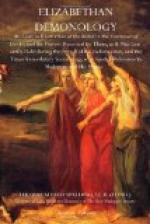[Footnote 2: “That ... swore as many oaths as I spake words, and broke them in the sweet face of heaven.”—l. 90.]
[Footnote 3: “Keep ... thy pen out of lenders’ books.”—l. 100.]
“Ere long Maister Edmunds beginneth againe his exorcismes, wherein he had not proceeded farre, but up cometh another spirit singing most filthy and baudy songs: every word almost that he spake was nothing but ribaldry. They that were present with one voyce affirmed that devill to be the author of Luxury.[1]
[Footnote 1: “Wine loved I deeply; dice dearly; and in women out-paramoured the Turk.”—l. 93.]
“Envy was described by disdainful looks and contemptuous speeches; Wrath, by furious gestures, and talke as though he would have fought;[1] Gluttony, by vomiting;[2] and Sloth,[3] by gasping and snorting, as though he had been asleepe."[4]
[Footnote 1: “Dog in madness, lion in prey.”—l. 96.]
[Footnote 2: “Wolf in greediness.”—Ibid.]
[Footnote 3: “Hog in sloth.”—l. 95.]
[Footnote 4: Harsnet, p. 278.]
A sort of prayer-meeting was then held for the relief of the distressed youth: “Whereupon the spirit of Pride departed in the forme of a Peacocke; the spirit of Sloth in the likenesse of an Asse; the spirit of Envy in the similitude of a Dog; the spirit of Gluttony in the forme of a Wolfe."[1]
[Footnote 1: The words, “Hog in sloth, fox in stealth, wolf in greediness, dog in madness, lion in prey,” are clearly an imperfect reminiscence of this part of the transaction.]
There is in another part of “King Lear” a further reference to the incidents attendant upon these exorcisms Edgar says,[1] “The foul fiend haunts poor Tom in the voice of a nightingale.” This seems to refer to the following incident related by Friswood Williams:—
“There was also another strange thing happened at Denham about a bird. Mistris Peckham had a nightingale, which she kept in a cage, wherein Maister Dibdale took great delight, and would often be playing with it. This nightingale was one night conveyed out of the cage, and being next morning diligently sought for, could not be heard of, till Maister Mainie’s devil, in one of his fits (as it was pretended), said that the wicked spirit which was in this examinate’s sister[2] had taken the bird out of the cage, and killed it in despite of Maister Dibdale."[3]
[Footnote 1: Act III. sc. vi. l. 31.]
[Footnote 2: Sara Williams.]
[Footnote 3: Harsnet, p. 225.]
73. The treatment to which, in consequence of his belief in possession, unfortunate persons like Mainy and Sommers, who were probably only suffering from some harmless form of mental disease, were subjected, was hardly calculated to effect a cure. The most ignorant quack was considered perfectly competent to deal with cases which, in reality, require the most delicate and judicious management, combined with




